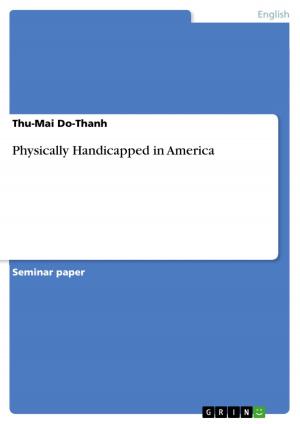| Author: | Robert Stolt | ISBN: | 9783640631995 |
| Publisher: | GRIN Publishing | Publication: | May 27, 2010 |
| Imprint: | GRIN Publishing | Language: | English |
| Author: | Robert Stolt |
| ISBN: | 9783640631995 |
| Publisher: | GRIN Publishing |
| Publication: | May 27, 2010 |
| Imprint: | GRIN Publishing |
| Language: | English |
Essay from the year 2010 in the subject Film Science, grade: 1,2, University of St Andrews, language: English, abstract: The family as an institution that is accountable for raising responsible and mature adults who become representatives of their societies is a key principle of social organisation (Bernardes 1997: 2, Hill 1998: 63). For children, familial life is the very first experience of social relations, through which they become part of a larger community. The intertwining of the levels of human aggregation can be studied 'as the complex mechanisms around which the history of a nation is constructed' (Ginsborg 2003: xiii). Thus, analysing the state of the family is an effective vehicle for tracing social and cultural conflicts within a nation. In respect thereof, this essay is aimed to explore the metaphoric effect of the families displayed in Amelio's Il ladro di Bambini and Saura's Cría Cuervos. This essay attempts to analyse how the families displayed in Ladro and Cría can be used to explore the state of the Italian and Spanish nation. Thus, in the second chapter the family shall be looked at as the base of social aggregation in the sense of Aristotle and de Bonald. Moreover, in chapter three the emphasis lies on the different generations in the two films that represent the countries' cultural, social and political changes. In chapter four, the contrast between old and modern that results from these changes will be looked at in more detail. Furthermore, chapter five will pursue the afore-mentioned issues with the focus on the dysfunctional family as a social and political metaphor. Lastly, chapter six shall conclude the essay with a retrospective analysis.
Essay from the year 2010 in the subject Film Science, grade: 1,2, University of St Andrews, language: English, abstract: The family as an institution that is accountable for raising responsible and mature adults who become representatives of their societies is a key principle of social organisation (Bernardes 1997: 2, Hill 1998: 63). For children, familial life is the very first experience of social relations, through which they become part of a larger community. The intertwining of the levels of human aggregation can be studied 'as the complex mechanisms around which the history of a nation is constructed' (Ginsborg 2003: xiii). Thus, analysing the state of the family is an effective vehicle for tracing social and cultural conflicts within a nation. In respect thereof, this essay is aimed to explore the metaphoric effect of the families displayed in Amelio's Il ladro di Bambini and Saura's Cría Cuervos. This essay attempts to analyse how the families displayed in Ladro and Cría can be used to explore the state of the Italian and Spanish nation. Thus, in the second chapter the family shall be looked at as the base of social aggregation in the sense of Aristotle and de Bonald. Moreover, in chapter three the emphasis lies on the different generations in the two films that represent the countries' cultural, social and political changes. In chapter four, the contrast between old and modern that results from these changes will be looked at in more detail. Furthermore, chapter five will pursue the afore-mentioned issues with the focus on the dysfunctional family as a social and political metaphor. Lastly, chapter six shall conclude the essay with a retrospective analysis.















